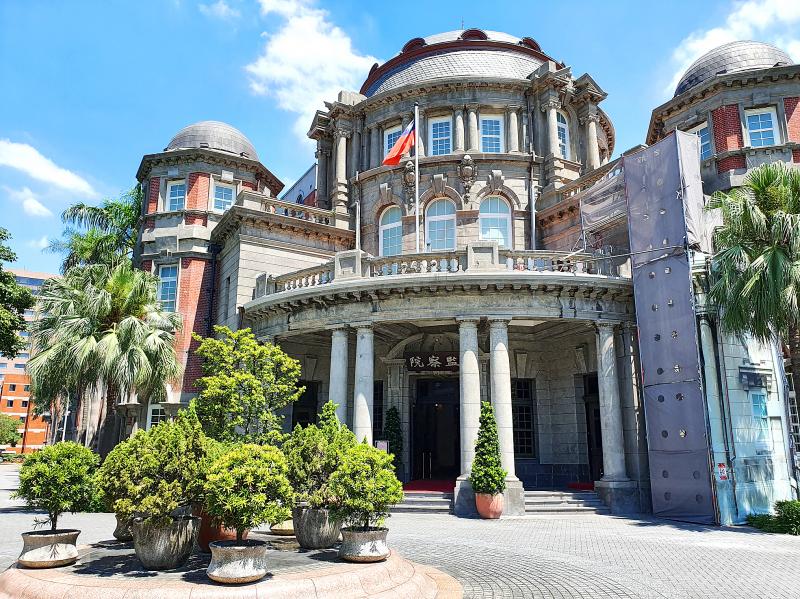Forced labor in Taiwan’s distant-water fishing fleet must be addressed, the Control Yuan said on Thursday, when it issued demands of government entities over the issue.
The US in a report on child and forced labor in September last year for the first time said that fish caught by Taiwanese-flagged vessels are products of forced labor.
“Crews on Taiwan-flagged vessels face confiscation of documents, long days with little rest, physical and verbal abuse, and lack of payment,” the US report said.

Photo: Hsieh Chun-lin, Taipei Times
Control Yuan member Wang Yu-ling (王幼玲) said that the Ministry of Foreign Affairs, the Ministry of Labor and the Fisheries Agency have known about forced labor on the Taiwanese fleet since as early as 2019, when Greenpeace released a report on the issue.
The government bodies knew that Greenpeace would submit its findings to Washington, but took no concrete measures to address the issue, Wang said.
To spur reforms, the Control Yuan has demanded that the three bodies take corrective measures to ensure fishers’ rights are protected.
It is also urging the Executive Yuan to make changes, she said.
If this issue is not dealt with, Taiwan faces being banned from exporting fish to the US and Europe, Control Yuan member Tsai Chung-yi (蔡崇義) said.
Among the demands is that the Fisheries Agency assign more personnel to conduct inspections, and for it and the Ministry of Labor to educate the fisheries industry on human rights.
Executive departments should ensure that their employees have a clear understanding of what constitutes forced labor, as such cases are sometimes classified as employer-employee disputes, the Control Yuan said in a statement.
Cross-agency communication — within executive departments and between departments and the Judicial Yuan — is required so reports of forced labor are dealt with efficiently and perpetrators punished, the statement said.
The Executive Yuan is required to evaluate whether a ban on products of child labor and forced labor is needed, as well as review policies on migrant fishers, it said.
Taiwan has 1,106 distant-water fishing vessels and the sector employs about 22,000 migrant fishers, the Control Yuan said.
However, the US report said that an estimated 35,000 migrant workers, mostly from Indonesia and the Philippines, work on such vessels, and that Taiwan’s fleet is the world’s second-largest, after China’s, the Control Yuan said.
The Fisheries Agency said in a statement that it would work to improve so Taiwan would not be included in a US report on child and forced labor again.
Taiwanese law says that after receiving a corrective measure issued by the Control Yuan, government departments should immediately make improvements or take appropriate action.
They should also reply to the Control Yuan in writing on improvements or actions.
If the Control Yuan receives no reply within two months, it may seek further details.

Taiwan is stepping up plans to create self-sufficient supply chains for combat drones and increase foreign orders from the US to counter China’s numerical superiority, a defense official said on Saturday. Commenting on condition of anonymity, the official said the nation’s armed forces are in agreement with US Admiral Samuel Paparo’s assessment that Taiwan’s military must be prepared to turn the nation’s waters into a “hellscape” for the Chinese People’s Liberation Army (PLA). Paparo, the commander of the US Indo-Pacific Command, reiterated the concept during a Congressional hearing in Washington on Wednesday. He first coined the term in a security conference last

Prosecutors today declined to say who was questioned regarding alleged forgery on petitions to recall Democratic Progressive Party (DPP) legislators, after Chinese-language media earlier reported that members of the Chinese Nationalist Party (KMT) Youth League were brought in for questioning. The Ministry of Justice Investigation Bureau confirmed that two people had been questioned, but did not disclose any further information about the ongoing investigation. KMT Youth League members Lee Hsiao-liang (李孝亮) and Liu Szu-yin (劉思吟) — who are leading the effort to recall DPP caucus chief executive Rosalia Wu (吳思瑤) and Legislator Wu Pei-yi (吳沛憶) — both posted on Facebook saying: “I

Sung Chien-liang (宋建樑), who led efforts to recall Democratic Progressive Party (DPP) Legislator Lee Kun-cheng (李坤城), was released on bail of NT$80,000 today amid outcry over his decision to wear a Nazi armband to questioning the night before. Sung arrived at the New Taipei District Prosecutors’ Office for questioning in a recall petition forgery case last night wearing a red armband bearing a swastika, carrying a copy of Adolf Hitler’s Mein Kampf and giving a Nazi salute. Sung left the building at 1:15am without the armband and covering the book with his coat. Lee said today that this is a serious

A court has approved Kaohsiung prosecutors’ request that two people working for Democratic Progressive Party (DPP) Legislator Lin Dai-hua (林岱樺) be detained, as a probe into two cases allegedly involving her continues. The request was made on Friday, after prosecutors raided Lin’s two offices and the staffers’ residences, and questioned five on suspicion of contravening the Anti-Corruption Act (貪汙治罪條例). The people included the directors of Lin’s Daliao (大寮) and Linyuan (林園) district offices in Kaohsiung, surnamed Chou (周) and Lin (林) respectively, as well as three other staffers. The prosecutors’ move came after they interrogated Lin Dai-hua on Wednesday. She appeared solemn following